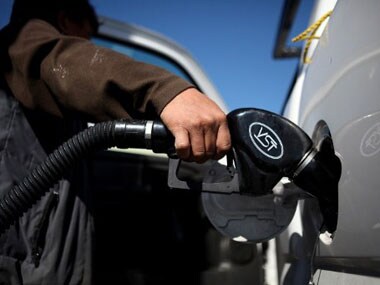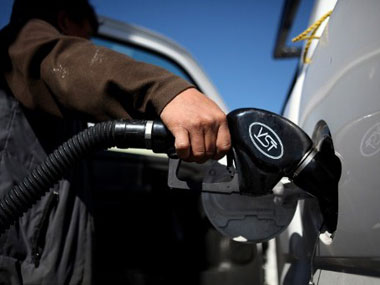With global crude prices headed southward for a long time and hovering around $40 a barrel mark, there is bound to be a reappraisal of the wisdom of stockpiling of oil for the rainy day even by the visionaries of the strategy. Strategic oil reserves have been piled up by developed countries since long but India joined the race in a me-too spirit with the proposal being mooted in 1998 but set in motion only in 2003. Thus was born Indian Strategic Petroleum Reserves Limited (ISPRL), a Special Purpose Vehicle (SPV), which is a wholly owned subsidiary of Oil Industry Development Board (OIDB). [caption id=“attachment_2408396” align=“alignleft” width=“380”]
 AFP[/caption] The SPV has built underground caverns beneath mountains in Mangalore, Padi and Vishakhapatnam at a cost of Rs 4,000 crore. But then the stock of oil that can be stored in these caverns is barely sufficient to meet 10 days consumption. Add to this the ballpark figure of $17 per barrel as carrying cost, it is bound to be a mug’s game. To be sure, India bought these reserves when the prices were softening but in inventory management the overall cost is considered which includes ordering cost, cost of material and cost of carrying that includes interest as well. Intuitively the overall cost of strategic reserves must be outweighing the benefits from it. The plummeting oil prices are not just a flash in the pan or one-off phenomenon. It has come to stay with a variety of reasons accounting for it. Chief among them are shale gas making US nearly self-sufficient in oil from the days of being the largest importer, the oil cartel OPEC being a divided house, non-OPEC members exerting considerable influence in the oil market and slowdown in European region and China. The US which led the developed nations with the idea of stockpile has built reserves of 90 days consumption and many have followed suit. It must be ruing though with the benefit of hindsight its decision to stockpile in view of its own rather serendipitous discovery of shale gas and dramatic fall in oil prices. Instead of piling strategic reserves, the Indian government should move strategically on the foreign policy front to cozy up to the gulf nations who could come to our rescue should a 1990 like crisis blow on our face. Prime Minister Narinder Modi went to the UAE recently. One wonders if this figured in the discussions with the UAE Emirs. India boasts 30% labor strength in this region and contributes significantly to its prosperity and well-being. It is not enough if in return the blue collar workers over there remit money back home. We must wangle more. An investment pledge of US$ 75 billion of course has been wangled. It might fully or partially materialize at a glacial pace as most of the promises of FDI have the knack of doing. What Modi could have asked for and got is a written promise of not letting us down should there be yet another oil crisis sending the prices sky high and availability squeezed. Modi can do this with the house of Saud when he takes wings to that nation soon. If Pakistan can get oil cheap from Saudi Arabia for being a Sunni nation, India should get its indulgence on strategic and economic grounds. Petrodollars have hitherto been languishing in the US bond markets. It is time they earned well through deployment in infrastructure projects in India. Indeed trade and investments must be the glue that should bond India with the gulf. India by and large buys oil in the spot market. It should employ economists capable of reading the tea leaves so that we can enter into forward contracts with countries in the gulf region. Forward contract means an agreement for supply of predetermined quantity of any commodity or currency at a predetermined price. If at the appointed time the spot price has appreciated, the buyer laughs all the way to the bank and if it has depreciated, the seller laughs all the way to the bank. But for a country which can ill-afford a debilitating oil shock, it has the advantage of capping the downside risks even if the prices fall. In any case, it has the virtues of just in time inventory management and thus eliminates carrying cost entailed by stockpiling strategy.
AFP[/caption] The SPV has built underground caverns beneath mountains in Mangalore, Padi and Vishakhapatnam at a cost of Rs 4,000 crore. But then the stock of oil that can be stored in these caverns is barely sufficient to meet 10 days consumption. Add to this the ballpark figure of $17 per barrel as carrying cost, it is bound to be a mug’s game. To be sure, India bought these reserves when the prices were softening but in inventory management the overall cost is considered which includes ordering cost, cost of material and cost of carrying that includes interest as well. Intuitively the overall cost of strategic reserves must be outweighing the benefits from it. The plummeting oil prices are not just a flash in the pan or one-off phenomenon. It has come to stay with a variety of reasons accounting for it. Chief among them are shale gas making US nearly self-sufficient in oil from the days of being the largest importer, the oil cartel OPEC being a divided house, non-OPEC members exerting considerable influence in the oil market and slowdown in European region and China. The US which led the developed nations with the idea of stockpile has built reserves of 90 days consumption and many have followed suit. It must be ruing though with the benefit of hindsight its decision to stockpile in view of its own rather serendipitous discovery of shale gas and dramatic fall in oil prices. Instead of piling strategic reserves, the Indian government should move strategically on the foreign policy front to cozy up to the gulf nations who could come to our rescue should a 1990 like crisis blow on our face. Prime Minister Narinder Modi went to the UAE recently. One wonders if this figured in the discussions with the UAE Emirs. India boasts 30% labor strength in this region and contributes significantly to its prosperity and well-being. It is not enough if in return the blue collar workers over there remit money back home. We must wangle more. An investment pledge of US$ 75 billion of course has been wangled. It might fully or partially materialize at a glacial pace as most of the promises of FDI have the knack of doing. What Modi could have asked for and got is a written promise of not letting us down should there be yet another oil crisis sending the prices sky high and availability squeezed. Modi can do this with the house of Saud when he takes wings to that nation soon. If Pakistan can get oil cheap from Saudi Arabia for being a Sunni nation, India should get its indulgence on strategic and economic grounds. Petrodollars have hitherto been languishing in the US bond markets. It is time they earned well through deployment in infrastructure projects in India. Indeed trade and investments must be the glue that should bond India with the gulf. India by and large buys oil in the spot market. It should employ economists capable of reading the tea leaves so that we can enter into forward contracts with countries in the gulf region. Forward contract means an agreement for supply of predetermined quantity of any commodity or currency at a predetermined price. If at the appointed time the spot price has appreciated, the buyer laughs all the way to the bank and if it has depreciated, the seller laughs all the way to the bank. But for a country which can ill-afford a debilitating oil shock, it has the advantage of capping the downside risks even if the prices fall. In any case, it has the virtues of just in time inventory management and thus eliminates carrying cost entailed by stockpiling strategy.
Oil dynamics are changing, stockpiling is thus a mug’s game
S Murlidharan
• August 26, 2015, 11:12:23 IST
With global crude prices headed southward for a long time and hovering around $40 a barrel mark, there is bound to be a reappraisal of the wisdom of stockpiling of oil for the rainy day even by the visionaries of the strategy. Strategic oil reserves have been piled up by developed countries since long but India joined the race in a me-too spirit with the proposal being mooted in 1998 but set in motion only in 2003.
Advertisement
)
End of Article